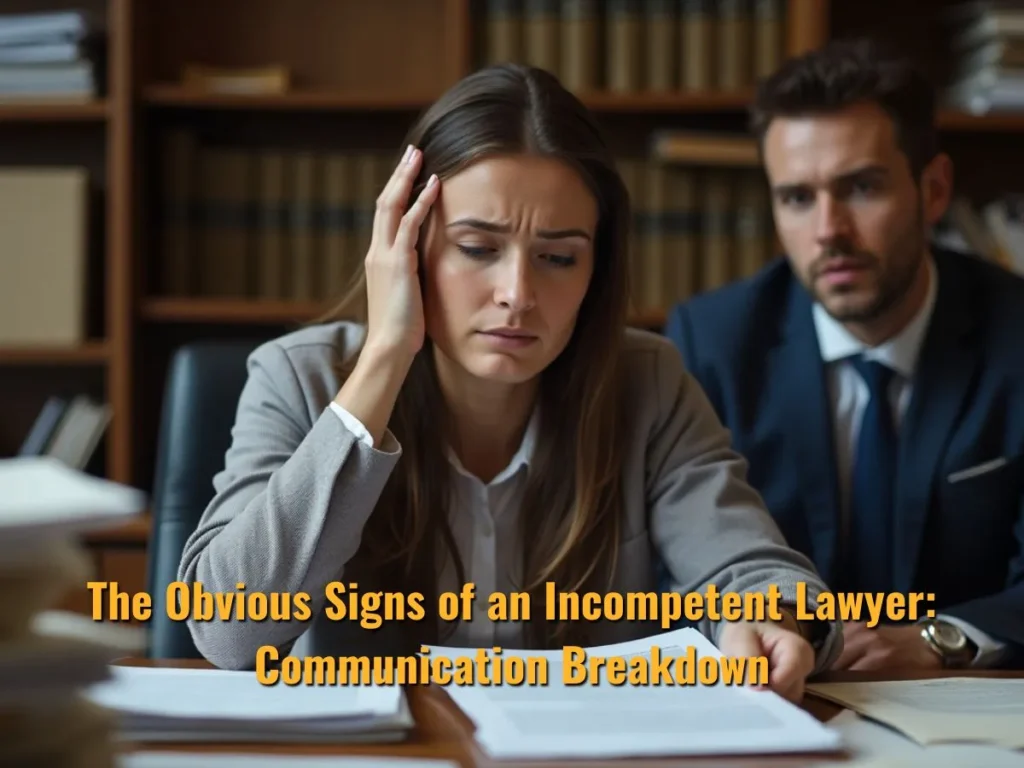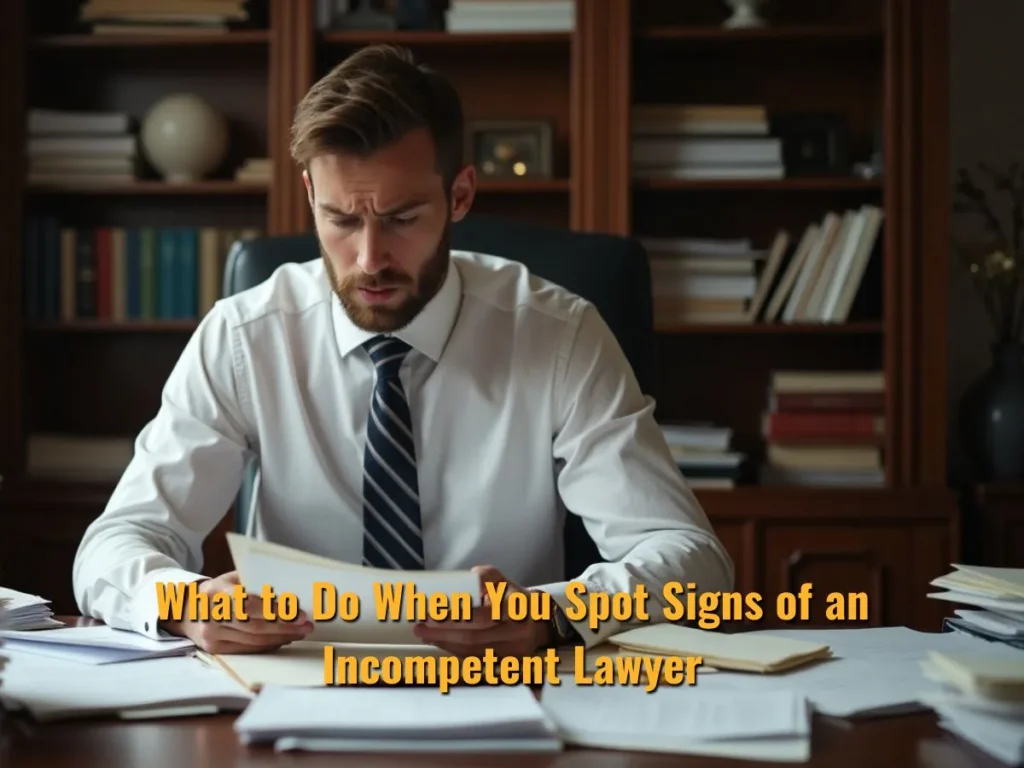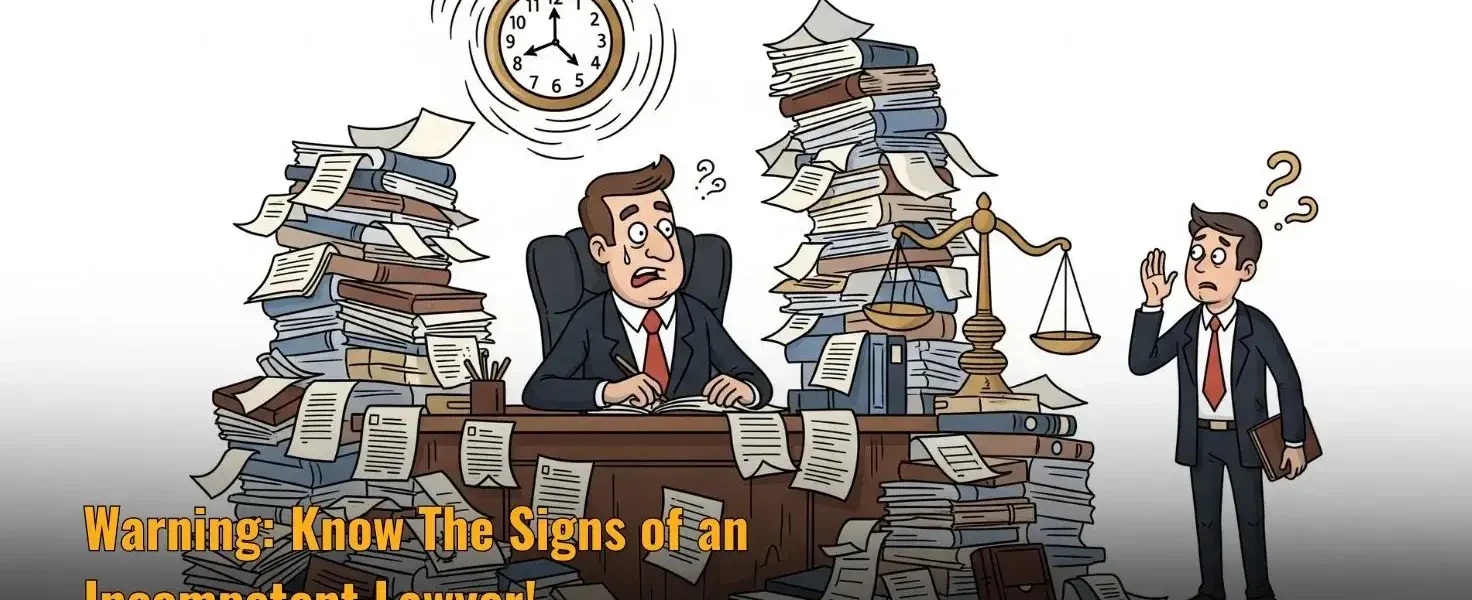Introduction
You’ve put your future, your finances, and your peace of mind in your lawyer’s hands. But what if you begin noticing signs of an incompetent lawyer?
As those first doubts blossom into flashing red lights, the fear of your legal matter can take its toll. This post provides you with the tools to identify these important signals from the outset.
In this way, you can safeguard your rights and ensure that your legal representation benefits you as much as possible.
The Obvious Signs of an Incompetent Lawyer: Communication Breakdown

If you notice the following Signs of an Incompetent Lawyer, it may be time to fire them. The most pervasive and frustrating indication that a lawyer has no idea what they are doing is a failure to communicate.
If you have a legal issue, being informed is crucial. The absence of regular, solid updates from your legal counsel can easily discourage the faith.
The number one gripe your clients have is being ignored, not being returned calls and emails. Despite the myriad demands on our time, there is a professional norm of responsiveness.
If your lawyer is regularly taking days or weeks to respond, or worse yet, doesn’t respond at all, this is a significant red flag.
You shouldn’t have to hunt your attorney down for basic status updates. However, it’s more than just inconvenient; it can lead to lost opportunities and important messages not reaching you when they’re needed.
Also, when a lawyer speaks in jargon to the point that it isn’t comprehensible and fails to take the time to ensure you get it, it would seem that this lawyer is incompetent in communication.
Their function is to take the mystery out of the law for you, not to make it more opaque. If you’re walking away from sessions even more confused, something has to give.
Likewise, the problem of never being able to get a staff member or paralegal on the phone, and the constant avoidance or evasiveness when you pin them down and ask a simple question, are endemic problems.
These are more than just a hectic schedule and suggest deeper issues with the firm or the attorney’s commitment. These are all important warnings of an incompetent attorney that should not be ignored.
Operational Signs of an Incompetent Lawyer: Disorganization & Delay
How your attorney works is a key indicator of whether you have an incompetent attorney. If your lawyer works in a certain way, it could be a key to telling whether or not you have an incompetent lawyer.
Disorder and unexplained delays aren’t only frustrating but also pose a direct threat to the prospects of your case.
Missed Deadlines & Appointments: A Critical Red Flag
One of the most important operational warning signs is the occurrence of missed appointments and deadlines. Deadlines in the law are deadlines. If you miss them, the results could be dire.
This could be the dismissal of your case, forfeiture of your rights, or penalties. For example, if your attorney or his/her firm often misses court dates, filing deadlines, or hangs up on you, it is a clear sign of incompetence and negligence. This is not just sloppiness; it is a dereliction of professional duty.
Disorganized Case Management: Losing Control of Details
Also very worrying is the disorganized nature of the case files. If your lawyer is constantly riffling through paperwork during a meeting, has trouble finding key documents, or asks for information you have already given during the intake process, it’s generally a sign of poor systematic management.
This kind of disarray can result in incorrect, omitted, or mismanaged case facts. No customer can afford to wait if they have a legal issue that needs attention.
Lack of Preparedness & Unexplained Delays
Not being ready for an emergency motion would suggest to me that an attorney has no idea what they are doing.
If your lawyer shows up in court, at a deposition, or to settle a case, not knowing the facts, not knowing the law, and not having any idea of your objectives, then they aren’t doing you any favors.
Your case deserves a lawyer who has done their homework. This often connects to unexplainable delays when you see no apparent reason or movement in your case.
Yes, things in the legal world can move at a snail’s pace sometimes, but there should always be a clear explanation for the delay and the specific steps your lawyer is taking to move things along. If they can’t, or the delays stem from their slow-walking, it’s time to worry.
Expertise & Strategy: Clear Signs of an Incompetent Lawyer in Action
A lawyer often displays their quality through their tactics and knowledge. Weaknesses here are telltale signs of an Incompetent Lawyer that may affect the outcome of your case.
Inadequate Legal Knowledge and Poor Strategy
One worrisome sign is a failure to understand the law. This could involve misunderstanding basic statutes or providing incorrect legal advice.
For instance, if an attorney doesn’t fully understand basic legal principles of your case, they could give you bad advice. This can result in wasted opportunities or huge reversals.
Close behind is a lack of strategy or no plan at all. A good attorney should have a set strategy for your case. They should present steps, goals, and any challenges.
When your attorney appears to be “winging it,” lacks a plan, or deviates from the course with no good reason, it’s a huge indicator of an incompetent lawyer. This often includes:
- Failure to explain risks and outcomes: A good lawyer clearly lays out all scenarios, best, worst, and most likely. They ensure you understand the possible effects of every decision. If they only paint a rosy picture or ignore your risk concerns, they aren’t giving honest advice.
- Reluctance to litigate (or over-litigating): Good lawyers regularly seek to resolve a case in an efficient manner. But to dodge court when adjudication is required, or to file useless motions to run up bills, is bad judgment.
Lack of Client Engagement and Hidden Fees
You need a lawyer who will listen to you as well. Your first-person account and your concerns are very important.
But if they reject your facts or refuse ever to consider your perspective, they might overlook pivotal elements of your argument. Finally, unexpected fees or mysterious charges are a very big red flag. Billing can be complex.
Yet a good, ethical lawyer is transparent, generating clear, itemized bills instead of surprise costs. These are the red flags of an inexperienced lawyer that they will likely encounter, indicating potential professional problems.
Beyond the Basics: Subtle Signs of an Incompetent Lawyer
Not all Signs of an Incompetent Lawyer are quite as obvious as unreturned phone calls. Sometimes the quiet clues are just as, if not more, revealing. These subtle cues can be a black mark against you and your case.
One subtle red flag is a lawyer who pressures you or consistently over-promises results. Optimism is fine, but a lawyer who promises a win or, even worse, an outlandish settlement tends to be unrealistic.
It may do this in an attempt to win your business. A good lawyer provides candid advice, recognizing the inherent risks in the law. Which is a hell of a lot different than being a lawyer who appears to put fees ahead of the merit of a case.
If any conversation about billing arises soon, or if their advice seems to be motivated by billing time rather than securing the best deal for you, it’s a worrying sign.
You should be on guard, too, if your attorney demonstrates that the profession has failed to teach her how to set boundaries, or how to be unprofessional in more interesting little second-cousin ways.
This might involve overpersonal sharing, a blurring of professional boundaries, or making inappropriate remarks. Small as they may seem, these habits can influence their professional mindset and hinder your full trust in them.
What to Do When You Spot Signs of an Incompetent Lawyer

If you recognize these warning signs in your attorney, and they are representing you, it’s natural to feel angry, scared, or even betrayed.
The good news is that you have options. Taking action now can help protect your legal rights and your future.
First, document everything. Keep a strict record of every communication (email, call log, meeting notes), missed GS deadlines, and any time you felt your lawyer lacked understanding.
Details are essential: dates, times, and clear descriptions. This documentation is crucial should you choose to pursue the matter.
Then schedule a face-to-face chat with your lawyer. Explain that you are worried in a calm, clear manner. Could you provide an example from your documentation?
Request a reason and what their plan is to avoid the same issues. At times, clear communication can clear up a misunderstanding or lead to a change in behavior.
They can refer you to a pro bono lawyer to properly address your concerns and eliminate the unethical act you’ve been asked to perform.
Many lawyers offer initial consultations. They will take a look at your case, evaluate the performance of your current attorney, and tell you your options without automatically taking over your case.
Conclusion:
Recognizing the signs of an incompetent lawyer is your first step in protecting yourself and your best interests in the law. We have covered everything from breakdowns in communication to more subtle matters of professionalism.
Although it may be difficult to face, pinpointing these cues allows you to take action. Your case is too important for anything other than proficient legal counsel.
It could be what costs you in the future and affects your case results. Don’t hesitate to seek clarity. Concerned about your current lawyer?
Schedule an appointment today for a complimentary consultation to receive expert advice on your options and ensure that your case is in good hands.
FAQs
What are common signs of an incompetent lawyer?
Lack of communication, broken promises, chaotic case management, and inadequate legal knowledge are typical red flags.
How can I tell if my lawyer is being negligent?
Your attorney shows signs of falling short through missed deadlines, unpreparedness, and neglecting to investigate your case fully.
What should I do if my lawyer isn’t communicating with me?
If your lawyer is refusing to communicate, make a record of all communication you have with your lawyer and ask to meet face-to-face to discuss the communication issues.
Can I fire my lawyer if I believe they are incompetent?
Yes, you can usually fire your lawyer if you think they are incompetent, although you may have to pay for services rendered.
Where can I report a lawyer for being unethical or incompetent?
You can generally report a rogue or incompetent lawyer to your state’s bar association or the disciplinary board for attorneys.








